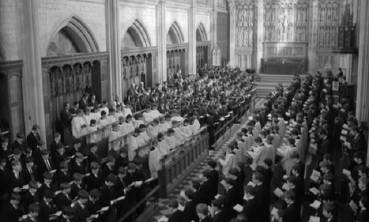"They ran out of colour film!" |
| Paul Merton, interviewing Stephen Fry, for Room 101 |
It's funny how misconceptions persist. Remember the fuss about 'Winterval'? Birmingham City Council made the term up to encapsulate the whole group of multi-cultural and multi-faith events occurring over the three month winter period. It was never supposed to supplant Christmas (indeed Christmas was Winterval's centre point so to speak). But the 'PC gone mad' idea of "Oh my god, they want to cancel Christmas!" persists to this day. Lemmings do not commit suicide (apart from man, which animal would exhibit suicidal tendencies? Now there's a survival mechanism at work...). That was Walt Disney's unscrupulous camera team herding the poor bastards over a cliff (now there's a Disney idea, cute animals throwing themselves to their death...) and Richard Gere, to my knowledge, has never officially owned a hamster.
Here's another one (thanks Mr. Merton). There are shots and sequences in If.... shot in black and white inter-cut with the colour material. Why? "They ran out of colour film!" No, Paul. No money in the budget? It's sort of true, obliquely. But the full truth is much more fun. Imagine. Your crew are on location in Cheltenham. In the Chapel, the light is streaming through the stained glass windows and it looks... well, divine – but there's not enough light. Colour film stock in the early 70s was not as flexible as it is today. Film technology has gathered apace perhaps (in its own silver-halide photo-chemical way) faster than high definition video. Most American HD shows shoot on 35mm film and given the choice, that's what I'd shoot on (and have done and am doing now). Well exposed, first generation 35mm film is a wonder to behold.
I spoke to the then camera operator (now acclaimed cinematographer and director), Chris Menges, about the movie's most talked about subject hoping to get the definitive answer based on the fact that the producer had said (in the Cast and Crew extra on the disc) that the decision was made for purely financial reasons. The assistant editor had disagreed, pushing the artistic reasons to the fore. This was a point of view I wanted to understand further. At the time shooting black and white photography was still an art that was greatly appreciated despite the fact colour had all but taken over. So the leap from colour to black and white in production terms wasn't as radical in the early 70s as it would be today.

Chris Menges told me that he had 100 ASA colour film stock and it was simply not fast enough, not up to the task to shoot the interiors of the Chapel; the wide shots Anderson had in mind required more 'brutes' (large movie lights) than the production could afford. So the compromise was suggested – that the shots would be shot in black and white. Menges, more than reasonably one would assume, questioned Anderson suggesting that "...the critics might have something to say about this." Anderson, in his own inimitable way announced "Tell 'em it's art..." and of course 'art' is precisely what it turned out to be... The decision kick-started a process that led Anderson to reinvent his shooting plan, throwing in (unforced) black and white shots and sequences throughout If.... Some of the sequences work gloriously as if designed by a higher power. The parallel bars seduction is so much more starkly powerful in black and white, a simple limited colour palette (shades of grey) illustrating a whole raft of complex emotions not to mention the sublime editing of the sequence.
It's remarkable how often mistakes and compromise produce everlasting cinematic images and emotions and careers. Would Spielberg be the 'Steven Spielberg Incorporated' he is today if Bruce the shark had worked as planned? Would Casablanca be so revered if Ronald Reagan had got the lead (and how would that have politically tilted the world in the 80s?) and more pertinently, would If.... have the power it still commands without that very simple compromise? Well, from this point of view, probably yes but it still adds a zesty spice to the heady mix.
My thanks to Chris Menges for his time
and setting one record straight.
If.... DVD review >>
|